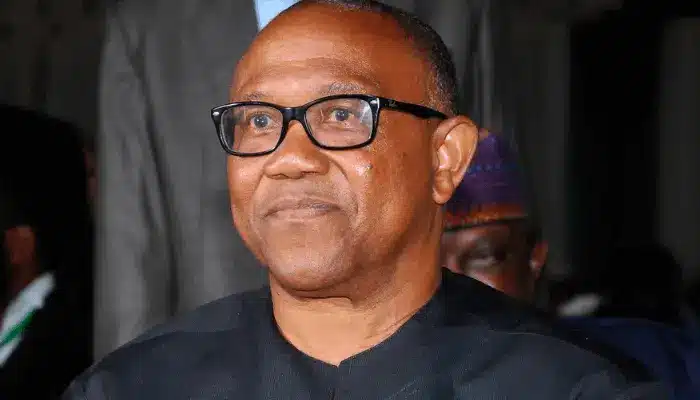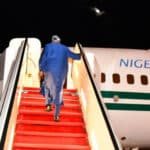Despite the rise in food prices and economic difficulties in the country, Ukraine recently donated 25,000 tonnes of wheat as emergency food aid to 1.3 million vulnerable people in Nigeria’s northeastern region. This action has been criticized by Mr. Peter Obi as disappointing.
“UKRAINE DONATES FOOD TO NIGERIA.Let me begin by sincerely appreciating the war-torn nation of Ukraine for their generous donation of tons of grains to Nigeria thereby aiding our current fight against nationwide hunger.As laudable as Ukraine’s kind gesture is, it speaks volumes for us as a people endowed with all needed human and natural resources, that a country officially prosecuting a brutal war of national survival with its powerful neighbor, Russia, is generous and kind enough with their food supplies to help us who are officially at peace.For the people of Ukraine, this act of human solidarity testifies to a rare generosity of spirit which should earn them greater global solidarity. It demonstrates our shared humanity.However, a situation like this underscores vigorously the importance of sound political leadership as the first concrete requirement for any nation desiring to develop and enhance the standard of living of its citizenry.It is disheartening that our once economically confident nation, blessed with vast arable land and abundant natural resources, now relies on a war-torn Ukraine for food assistance.This national disgrace stems from years of leadership failure, necessitating urgent reflection and a reordering of our national priorities and resource management and allocation. Instructively, Ukraine, with a population of 43 million on 603,728 km2, outshines Northern Nigeria, covering 744,249 km2 with a young, energetic population exceeding 100 million.In 2015, Ukraine’s GDP per capita was $2125, compared to Nigeria’s $2680. By 2022, despite being at war, Ukraine’s GDP per capita exceeded $4000, while Nigeria’s regressed to $2184. Ukraine cultivates over 60% of its arable land, whereas Nigeria has over 60% uncultivated arable land.Despite the conflict, Ukraine feeds itself, and exports agricultural products worth over $ 25 billion which is about the same value as our crude oil export earnings, and it serves as a strategic global food supplier, even providing aid to a peaceful yet unproductive Nigeria.To overcome this embarrassment, we must aggressively reorder our priorities by investing resources in productive sectors like agriculture. Addressing insecurity is crucial for farmers to return to their fields, enabling a productive manufacturing sector and supporting small businesses.In 4 to 5 years, this concerted effort can reverse the current trend, leading us toward a productive and New Nigeria that I believe is possible and within reach.” Obi, who was the Labour Party‘s Presidential Candidate in the last election, praised Ukraine’s gesture but also highlighted the failure of the Nigerian government to take care of its citizens.
In a series of posts on X (formerly Twitter) on Monday, Mr. Obi stated that this situation reflects a national shame caused by years of poor leadership. He called for urgent reflection and a reevaluation of national priorities and resource management.
He commended the people of Ukraine for their generosity, which he believes should be recognized globally.
However, the former Governor of Anambra State emphasized the crucial role of strong political leadership in the development and improvement of the quality of life for a nation’s people.
He finds it disappointing that Nigeria, once a financially stable country with plenty of fertile land and rich natural resources, now depends on a conflict-ridden Ukraine for food aid.
Read the full statement below:
“UKRAINE DONATES FOOD TO NIGERIA.
Let me begin by sincerely appreciating the war-torn nation of Ukraine for their generous donation of tons of grains to Nigeria thereby aiding our current fight against nationwide hunger.
As laudable as Ukraine’s kind gesture is, it speaks volumes for us as a people endowed with all needed human and natural resources, that a country officially prosecuting a brutal war of national survival with its powerful neighbor, Russia, is generous and kind enough with their food supplies to help us who are officially at peace.
For the people of Ukraine, this act of human solidarity testifies to a rare generosity of spirit which should earn them greater global solidarity. It demonstrates our shared humanity.
However, a situation like this underscores vigorously the importance of sound political leadership as the first concrete requirement for any nation desiring to develop and enhance the standard of living of its citizenry.
It is disheartening that our once economically confident nation, blessed with vast arable land and abundant natural resources, now relies on a war-torn Ukraine for food assistance.
This national disgrace stems from years of leadership failure, necessitating urgent reflection and a reordering of our national priorities and resource management and allocation. Instructively, Ukraine, with a population of 43 million on 603,728 km2, outshines Northern Nigeria, covering 744,249 km2 with a young, energetic population exceeding 100 million.
In 2015, Ukraine’s GDP per capita was $2125, compared to Nigeria’s $2680. By 2022, despite being at war, Ukraine’s GDP per capita exceeded $4000, while Nigeria’s regressed to $2184. Ukraine cultivates over 60% of its arable land, whereas Nigeria has over 60% uncultivated arable land.
Despite the conflict, Ukraine feeds itself, and exports agricultural products worth over $ 25 billion which is about the same value as our crude oil export earnings, and it serves as a strategic global food supplier, even providing aid to a peaceful yet unproductive Nigeria.
To overcome this embarrassment, we must aggressively reorder our priorities by investing resources in productive sectors like agriculture. Addressing insecurity is crucial for farmers to return to their fields, enabling a productive manufacturing sector and supporting small businesses.
In 4 to 5 years, this concerted effort can reverse the current trend, leading us toward a productive and New Nigeria that I believe is possible and within reach.”




